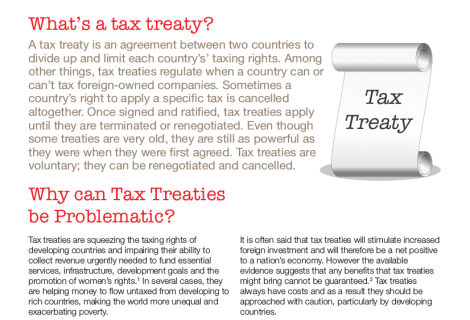
What’s a tax treaty?
A tax treaty is an agreement between two countries to divide up and limit each country’s’ taxing rights. Among other things, tax treaties regulate when a country can or can’t tax foreign-owned companies. Sometimes a country’s right to apply a specific tax is cancelled altogether. Once signed and ratified, tax treaties apply until they are terminated or renegotiated. Even though some treaties are very old, they are still as powerful as they were when they were first agreed. Tax treaties are voluntary; they can be renegotiated and cancelled.
Why can Tax Treaties be Problematic?
Tax treaties are squeezing the taxing rights of developing countries and impairing their ability to collect revenue urgently needed to fund essential services, infrastructure, development goals and the promotion of women’s rights. 1 In several cases, they are helping money to flow untaxed from developing to rich countries, making the world more unequal and exacerbating poverty.
It is often said that tax treaties will stimulate increased foreign investment and will therefore be a net positive to a nation’s economy. However the available evidence suggests that any benefits that tax treaties might bring cannot be guaranteed. 2 Tax treaties always have costs and as a result they should be approached with caution, particularly by developing countries.
For example, Malawi lost out on US$27 million in taxes, as the Australian mining company Paladin shifted significant sums of money out of Malawi and back to Australia via the Netherlands. The tax savings were made possible due to the old Malawi - Netherlands tax treaty that exempts interests and management fees from tax in Malawi. 3 If the US$27 million could have been spent on public services for the people of Malawi instead, it could have paid for 275,000 annual HIV/AIDS treatments; or 5,400 annual doctors’ salaries; or as many as 25,000 annual teachers’ salaries.